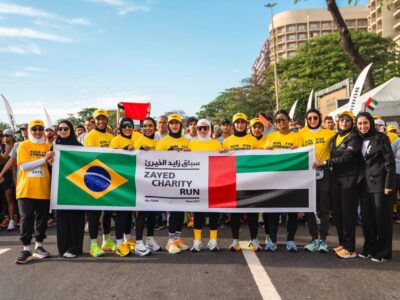Vaccines are among the most significant advancements in public health history, leading to the control, eradication, or near-elimination of many infectious diseases that were once widespread and often fatal.[i] Along with access to clean water and good sanitation, vaccines safeguard our communities and help healthy people stay well, productive, and active.,[ii]However, we are far from reaching the full potential of vaccines for human wellbeing.
The World Health Organisation (WHO) notes that acute respiratory infections (ARI) are responsible for almost 20 percent of all deaths of children aged less than five years worldwide. In older adults, lower respiratory infections consistently rank among the top five WHO leading causes of death globally. The Middle East is exposed to global health threats including climate change, multi-drug-resistant bacteria, and the challenge of keeping populations living longer and more productive lives.
Keeping people healthy through innovative medicines and vaccines is a cornerstone to Pfizer’s mission to create breakthroughs that improve the quality and duration of patients’ lives.
Addressing respiratory health
In 2000, Pfizer pioneered the use of novel conjugation technology, which led to the introduction of groundbreaking pneumococcal vaccines, ones that were effective even in young children, and reduced the incidence of disease and rates of transmission. The latest pneumococcal vaccine now has the potential to cover more of the serotypes that cause the clinically significant remaining burden of infant pneumococcal disease than any other currently licensed vaccine.
For RSV, Pfizer’s latest vaccine on the market, received approval in the United States of America in 2023. It is also available in many countries in the Middle East, including Saudi Arabia, Egypt, UAE, and other Gulf countries. However, the development of the vaccine has been decades in the making.
RSV and Pneumococcal disease in adults disproportionately affect communities that are historically underserved, including lower socioeconomic groups, but vaccination can help reduce social and economic inequalities related to the disease. By reducing infection in the first place, vaccination can prevent the follow-on economic impacts of the disease, including lost wages for the individual and family members who are taking care of them.
Tackling unique regional health challenges
Leveraging strategic partnerships and collaborations, Pfizer’s efforts in the Middle East aim to create sustainable and resilient healthcare systems by improving access to vaccines, and increasing public awareness. In areas with limited healthcare infrastructure, Pfizer has initiated efforts to educate healthcare workers and the public about the importance of vaccines and the management of vaccine-related challenges. Pfizer also collaborates with regional research institutions and universities to study the prevalence of infectious diseases, and support surveillance programs to help tailor vaccine strategies to the specific needs of the region.
For example, densely populated crowds from different parts of the world, as seen during the annual Hajj season in Mecca, Saudi Arabia, in addition to other tourist hotspots in the region, often come with a risk of spread of meningococcal disease.
In addition to other vaccines in our portfolio, Pfizer has expanded the breadth of coverage for meningococcal disease with the convenience of a single injection available for older children and young adults (10-25 years) that protects against all five of the most common serogroups that cause meningococcal disease.
Expanding protection to vulnerable groups
Pfizer aims to expand the reach of its vaccine portfolios with innovative solutions that target vulnerable groups. This includes maternal vaccinations to protect infants from their first breath and vaccines that specifically target the older population.
Pfizer is strongly committed to the science behind maternal immunisation: Utilising the power of maternal antibodies augmented by vaccination to pass to the infant via the placenta to potentially provide protection from the first breath. Pfizer’s COVID-19 vaccine has been broadly recommended during pregnancy to protect both the mother and the infant. Similarly, the RSV vaccine has the potential to protect infants through the first 6 months of age. We are now exploring addition maternal immunisation candidates including a vaccine against group B streptococcal disease that can cause serious neonatal bacterial infection.

Looking ahead
Due to changing climates that now enable certain pathogens to thrive, increased migration to urban areas, and people traveling both within and across borders, the region faces numerous factors that facilitate the spread of infectious diseases. Ensuring equitable access and accelerating the availability of potentially life-saving vaccines worldwide is a key part of our commitment to improving global health.
With our industry-leading pipeline, scientific expertise, and comprehensive global capabilities, Pfizer is at the forefront of a new era in vaccine innovation to help address these challenges. Regionally, Pfizer has been expanding its manufacturing and distribution networks to reduce vaccine shortages and strengthen regional healthcare resilience. This includes partnerships with local companies to enhance production capabilities for vaccines against infectious diseases.
Pfizer also strongly believes in partnering with local leaders to develop evidence-based solutions to the most pressing health concerns. This includes gaining a better understanding of the local disease burden and the impact of vaccination campaigns on countries in the region.
[i] Greenwood B. The contribution of vaccination to global health: past, present and future. Philos Trans R Soc Lond B Biol Sci. 2014;369(1645):20130433. Published 2014 May 12. doi:10.1098/rstb.2013.0433
Brand View allows our business partners to share content with Arabian Business readers.
The content is supplied by Arabian Business Brand View Partners.








